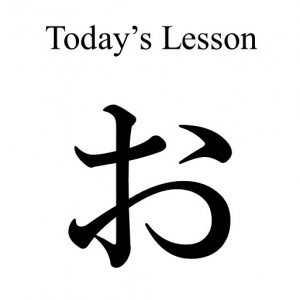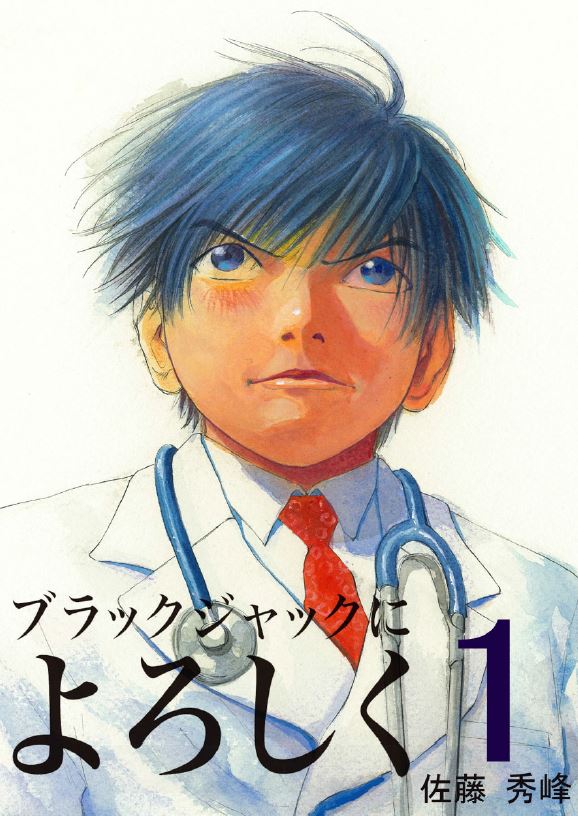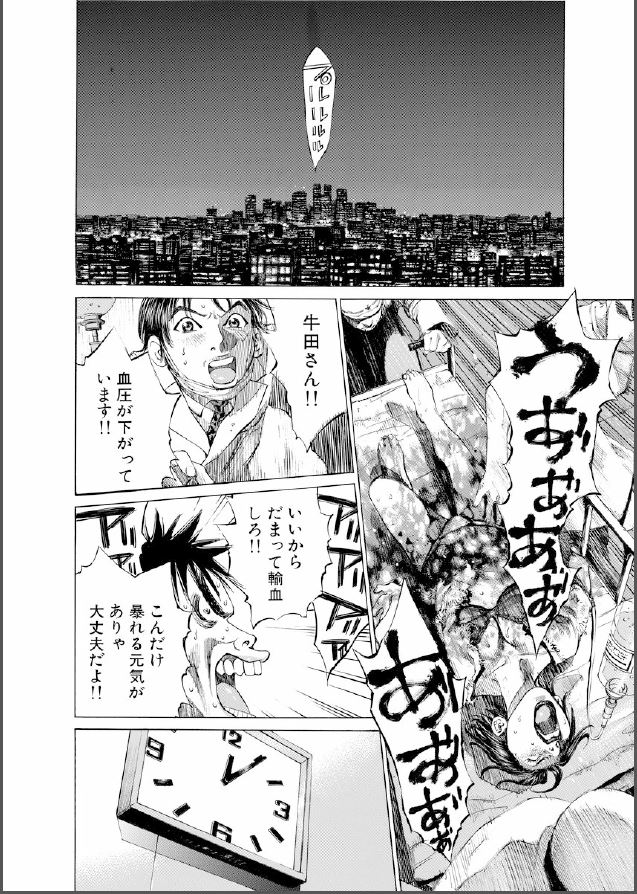*These Japanese lessons are created based on the Terms of Use of the Copyrights of them; TITLE: Give My Regards to Black Jack, AUTHOR: Shuho Sato, and WEBSITE: Manga on Web.
Japanese Lessons 1-1-2 研修医の夜 / Night of the Intern
You can browse all of the pages by clicking the picture above and then move to any page via 「目次」 at the left. When you need English translations or explanations, please return here and refer them. This article covers from page 20 to page 39.
Japanese Script with English Translation
「牛田さん!血圧が下がっています!」「いいからだまって輸血しろ!こんだけ暴れる元気がありゃ*大丈夫だよ!」
“Mr. Ushida! Her blood pressure’s dropping!” “Just shut up and give her the transfusion. If she can scream that damn much, then she’ll be alright!”
[adsense]
One Point Lesson: Japanese Vocabulary
「ありゃ」 is a masculine expression in casual tone, and equivalent to 「あれば」.
「事故です!患者は胸を打って、呼吸がうまくできないそうです*!」
“I’ve got an accident victim! His heart beat is irregular, and he’s having trouble breathing!
One Point Lesson: Japanese Grammar
One of the meanings; そう(だ / です)is a hearsay expression. Through this word, we can guess the person calling to Mr. Ushida has not seen the victim physically.
「60代の男性!交差点で正面衝突、意識不明です!」
“We’ve got a male in his 60’s! He’s still unconscious from a head-on collision at a stop light!”
スゴイな…牛田さん…。
“Wow… Mr. Ushida is amazing…”
「何笑ってんだよ…永大出。」「この病院はすばらしいです。絶対に救急車の受け入れを拒否しない…。」「素人みたいな事言ってんじゃねーよ…お前…。医者の医療行為は全部点数制になってる…カンチョーしたら42点…採血したら12点、その点数の合計が医療保険から医者に支払われる。一律一点10円だ。」「はぁ。」「ところが交通事故の場合はちょっと違う…。治療費は医療保険ではなく、自動車損害賠償保険から支払われる。“自由診療”って言ってな…この場合は”点数単価”、要するに点数の値段を医者が勝手に決められる。」「…って事はつまり…交通事故の場合は好きなだけ医療費がとれるって事ですか…?」「気づいていたか…?ウチが受け入れているのは交通事故の患者だけだ…。この病院は交通事故の場合、一点単価は40円。いまだに普通の4倍もぼったくってる*。結局 金なんだよ…社会奉仕でやってるわけじゃねぇ…。」
“What’re you smiling about, Eiroku?” “This hospital is amazing. How it never turns away an ambulance.” “Stop talking like a damn amateur. Shit… A doctor’s actions are all based on a point system… If you give an enema, you get 42 points… draw blood and you get 12 points. The total number of points gets paid to the doctor out of health insurance. Across the board, 10 cents for each point.” “Okay…” “But traffic accidents are different. The money isn’t paid out of health insurance, but out of vehicle liability insurance. So the price is left up to the “doctor’s discretion”. In this case, a doctor can just decide on his own how much a single point should cost.” “In other words… when a doctor is dealing with a patient from a traffic accident, he can charge however much money he wants…” “Didn’t you notice? The only patients we accept are from traffic accidents. At this hospital, we charge 40 cents for each point in traffic accidents. We’re overcharging them four times the normal rate. In the end, It’s all for the money. It’s not like we’re doing this as a public service…”
One Point Lesson: Japanese Vocabulary
「ぼったくる」 is a little bit of a casual expression. If you would like to say this in a formal setting , it should be like 「過剰請求」.
バイト代は8万円だった。たった一晩で研修医としての月給の2倍以上を稼いだ。
I made 94 dollars. In just one night, I made over twice my monthly salary as an intern…
「きのうも睡眠時間3時間…この世で一番不健康*なのは研修医だな…。で…?そっちはどうだった…?バイト…。」「…うん。」
“I only slept 3 hours again last night… Interns have got to be the unhealthiest people in the world…So…? How was the part-time job?” “Uh…”
「誰だろう…?」「また亡くなっちゃったんだな…。」
“Who’s that?” “Looks like another patient died…”
One Point Lesson: Japanese Vocabulary
This Kanji; 「不」 is equivalent “un”, “in” or ”im” in English such as 「不可能 = impossible」 and 「不親切 = unkind」.
「受けとっちゃっていいのかな…この8万円…。」「いーんじゃねーのー…そんだけ働いたんだし…。」「だけど…こんなお金…僕は汚い大人になんか*なりたくない…。」「オレさ…正直言って医者になりたいって思った事ないのよ…。受験戦争のエスカレーターに乗ってひたすら上を目指してさ…気がついたら医者になってた…。医者って…一体なんなんだろうな…。」
“Me taking this $948… Is it really okay?” “Why not…? You worked pretty hard for it.” ”Yeah, but… this kind of money is… I… I don’t want to become a corrupt doctor…” “You know what? To be honest, I never really wanted to be a doctor… I just rode the exam war escalator, trying my hardest to get to the top… Next thing I knew, I’d become a doctor… A doctor huh…? What does that even mean…?”
One Point Lesson: Japanese Vocabulary
「なんか」 indicates a derogatory nuance and can be used in this way: 「テストなんか無くなればいいのに。I wish examinations would disappear.」
(誠同病院)
(Sado Hospital)
「今夜は10万円出そう…。」「え!?」「今夜から君一人だ。不満ならもっと出すぞ。」「いえ…そんなんじゃ…。」「一人じゃ不安か?」「現在日本には24万の医師がいる。君はこの数字をどう思う?」「人口500人につき一人の医師…これは他の先進国に引けを取りません…。たいしたものだと思います…。」「模範*解答だな…だけど大事な事を忘れている…。病院の数だ。日本は医者も多いが、病院の数もべらぼうに多い、だからうちほどの規模の病院に勤務医はたったの3人だ。つまり…日本は一つの病院あたりの医者の数は極めて少ない。」「…分かっています…。医者だって家庭もあるし、人間です…。たった3人で毎日日勤して、その上夜勤までなんてカバーできません。」
“I’ll give you $1186 tonight.” “What!?” “It’s going to be just you from tonight on. If that’s not enough I can give you more.” “No… that’s not what I…” “Uneasy by yourself?” “There are currently 240,000 doctors in Japan. What does that number tell you?” “That there’s about one doctor for every 500 people. That can’t be beaten by any other first-world country. It’s pretty impressive, I think.” “Good answer. But you’re forgetting something important… The number of hospitals. Japan has a lot of doctors, but it also has a ridiculous number of hospitals. That’s why even a hospital as big as ours only has three doctors. To put it simply…the number of doctors to a single hospital in Japan is extremely small.” “I know that… Doctors are people too… with families of their own. Three doctors wouldn’t be able to cover both day shifts and night shifts everyday.”
One Point Lesson: Japanese Vocabulary
「模範」 literally means “model” or “good example”. However, 「模範解答」 sometimes has a negative nuance such as “you don’t know real activities” and “you just follow textbooks”.
なんだか自分がとても悪い事をしている気がした。生活費が欲しかった。夜間の病院には研修医しかいない。それは*大学病院などを除けば、珍しい事ではない…。むしろ日本中の病院で、それが常識なのだ…。死にたくなければ、夜間に車に乗ってはいけない…。万が一、事故を起こしたとしても、まともな医者に診察してもらえる可能性はほとんどない…。それがこの国の夜だ…。
I feel like I just did something very bad. I needed money for my living expenses. At night, there’re only interns in a hospital. With the exception of university hospitals, that’s not unusual… Quite the opposite, for hospitals in Japan, it’s just common sense. If you don’t want to die, don’t ride your car at night. If you do happen to get in an accident, the chance of you being seen by an experienced doctor is… close to zero… This is night in Japan.
One Point Lesson: Japanese Expressions
This is an advanced expression. By separating the main clause, the author emphasizes the situation. If we said it plainly , it would be like 「夜間の病院に研修医しかいないことは、大学病院などを除けば、珍しい事ではない」.
全国の79の大学付属病院に対するアンケートの結果、研修医のアルバイトが禁止されているのは全体の2%に過ぎず、アルバイトに出た研修医のうちの80%が単独診療を経験しているという。しかも単独診療を経験した研修医の実に90%以上が不安を抱えながら診療をしている実態にある*。(全日本医学生自治会連合によるアンケートより)
In a survey of 79 university hospitals from all around the country, no more than 2% forbade their interns from part-time work. 80% of the interns involved in part-time work had treated patients with no supervision. Additionally, over 90% of the interns treating patients unsupervised, treated their patients while in a state of unease. (Data taken from a survey of Association of Independent Japanese Medical Students)
One Point Lesson: Japanese Expressions
When it comes to 「ある」 Vs. 「あります」 or 「いる」 Vs. 「います」, although both of them are formal expression, 「ある」 and 「いる」 are generally used only in written Japanese or from superior people to inferior people.
「事故です。20代の男性、外傷、打撲、全身に骨折の可能性があります。レベル30、呼吸24、脈拍120です。本部、急いでください!こっちは出発できる状態です!」
“There was a traffic accident, male, mid 20’s. Trauma, bruising, possibly multiple bone fractures all over his body. Level 30, respiration: 24, pulse: 120. Get this man to the hospital immediately! We’re ready to go!”
Recommended Links
Program Table of Japanese Lessons

Japanese Vowels: How to Pronounce お

Japanese Lessons: Learn Japanese Native Expressions with Manga 1-1-3



